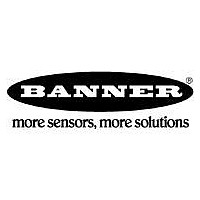SP100R BANNER ENGINEERING, SP100R Datasheet - Page 7

SP100R
Manufacturer Part Number
SP100R
Description
PHOTO SENSOR RECEIVER
Manufacturer
BANNER ENGINEERING
Datasheet
1.MA3.pdf
(20 pages)
Specifications of SP100R
Output Current
150mA
Sensor Output
NPN Open Collector
Supply Voltage Range Dc
10V To 30V
Leaded Process Compatible
No
Peak Reflow Compatible (260 C)
No
"WB" in this model number designates "wide beam". The LP400WB is an
infrared divergent mode (wide angle diffuse mode) sensor which is particu-
larly forgiving for reflectively sensing transparent or translucent materials or
LP400WB
Model SP300L is a remote retroreflective sensor with the same rugged design
as the SP300EL/RL, described above. Its useable range is from 6 inches to 15
feet (0,2 to 4,5m) using the model BRT-3 retroreflector.
Range: 3 inches (76mm)
Temp. range: -40 to +80 C
Housing material: blue anodized
aluminum
Emitter-receiver pair SP300EL/RL are extremely rugged and are totally
encapsulated in anodized aluminum housings. The threaded hub at the cable
exit allows for the use of flexible armored cable or protective PVC tubing with
the addition of compression gland model CF7-16. This pair uses collimating
Sensors for use with MA3-4 and MA3-4P Modulated Amplifiers
Sensors are epoxy-encapsulated. Cables are 6-1/2 feet (2m) long. 30-foot (9m) cables available by special order.
Range: 15 feet (4,5m)
Temp. range: -40 to +80 C
SP300EL & SP300RL
Range: 50 feet (15m)
Effective Beam: .5 inch (13mm)
dia.
SP300L
with BRT-3 retroreflector
Models/Dimensions
DIVERGENT Mode
Housing material: blue anodized
aluminum
Temp. range: -40 to +100 C
Housing material: anodized
aluminum
If the object that is to break the beam has a shiny surface, then the SP300L and
its retroreflector should be mounted so that the beam is at an angle of 10 degrees
or more to that surface in order to eliminate false signals which are caused by
proxing.
for sensing objects with irregular surfaces (e.g.- webs with "flutter"). The optics
are such that even small threads or wires .005" (0,1mm) or greater in diameter
may be detected when they pass within .25" (6mm) of the sensor's plastic lens.
Due to its wide response pattern, the LP400WB should not be used for precise
positioning control, nor should it be mounted with its lens recessed into a hole.
lenses to increase range. These sensors should also be used at short ranges for
their high excess gain or to avoid optical "crosstalk" in situations which require
several pairs to be mounted adjacent to one another.
Long Range
OPPOSED Mode
RETROREFLECTIVE
Mode
E
X
C
E
S
S
G
A
I
N
E
X
C
E
S
S
G
A
I
N
I
E
X
C
E
S
S
G
A
I
N
I
I
1000
1000
1000
100
100
100
10
10
10
.1 FT
.1 IN
.1 FT
1
1
1
Excess Gain
with
BRT-T tape
SP300EL/RL
LP400WB
with
BRT-1 target
1 FT
1 FT
1 IN
SP300L
DISTANCE
DISTANCE
DISTANCE
Range based on
90% reflectance
white test card
10 FT
10 IN
10 FT
with
BRT-3 target
100 FT
100 FT
100 IN
I
N
C
H
E
S
I
N
C
H
E
S
I
N
C
H
E
S
DISTANCE TO 90% WHITE TEST CARD--INCHES
1.5
1.0
1.0
1.5
18
12
12
18
.5
.5
0
6
4
2
0
2
4
6
Beam Pattern
6
0
6
0
0
0
SP300EL/RL
DISTANCE TO REFLECTOR--FEET
10
4
OPPOSED DISTANCE --FEET
1
with BRT-3 reflector
SP300L
20
2
8
LP400WB
3
12
30
4
40
15
5
50
18
7














